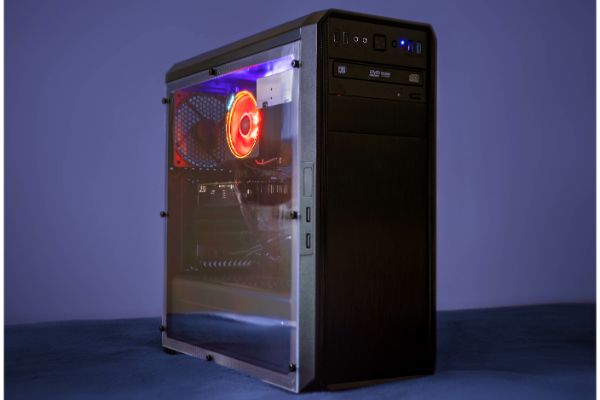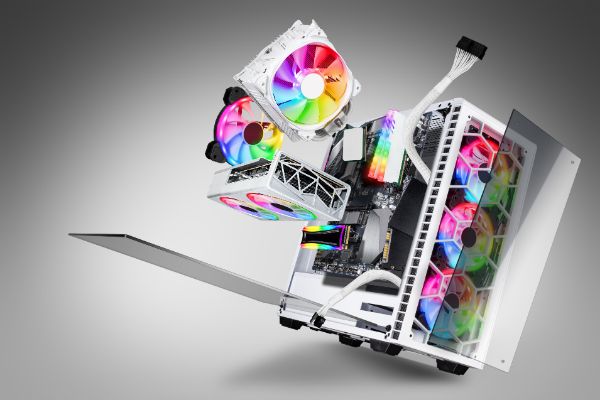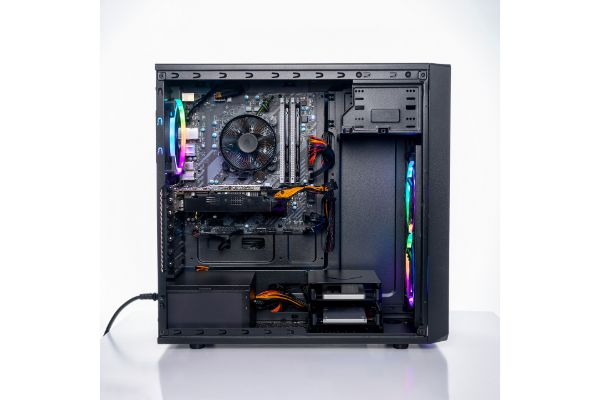Disclaimer: This post may contain affiliate links, meaning we get a small commission if you make a purchase through our links, at no cost to you. For more information, please visit our Disclaimer Page.
Desktop computers with the traditional tower cases represent just one type of system you can buy or build. However, they might be what most people think of when they consider what a typical computer looks like. The case of your personal computer is one of its most important parts. It is responsible for keeping all of the hardware that makes your PC run in one safe location.
The parts inside your case also benefit from good, concentrated airflow that helps to keep everything cool. In the past, it was normal to use some type of plastic to build all the panels of a computer case. Although this is still true, panels of tempered glass have entered the market in recent years.
Some consumers who are looking to buy or build a new computer of their own might wonder why some parts manufacturers use tempered glass as paneling for different computer cases. We’ll use our article today as a way to shed some light on this topic. Moving along, we can also cover some of the usual benefits or drawbacks that some people might find out about when they want to use tempered glass panels in their PC cases.
As we go deeper, we’ll discuss what the outer temperatures of tempered glass should feel like when the PC is operating normally, and we will consider whether it is okay to take the glass panels off your case entirely.
Table of Contents
Why Do PC Cases Use Tempered Glass?
When we consider the question of why a computer case might use one material for its paneling, we’re really asking why it has become a more standard option than it was in the past. Although some of this can be subjective and depend on the tastes of the individual, we might be able to note down a few markers that can give us clearer insights into this. If you go to any online communities, you will get various answers that might come down to personal preferences.
However, there are a few practical reasons why a person might prefer tempered glass in their personal desktop cases. We will get to some of the major benefits and possible downsides in a later section, but a big part of the reason that the manufacturers of these panels temper the glass has to do with strength.
Regular glass might have some strength to it. However, developers can temper glass to increase its overall durability. When a manufacturer tempers glass panes, they use a combination of chemicals to treat the glass as they are developing it. By doing so, the glass becomes harder and more resistant to damage than your typical pane of regular glass. This improved hardness level is beneficial in many applications, but it is particularly useful when we consider computer cases.
Many of the components that a typical computer case encapsulates have delicate circuitry. Any disruption or jostling of the parts inside the case could cause a host of problems for the rig. At best, you might deal with a sluggish machine.
At worst, a part could malfunction in such a way that you can no longer use the computer properly without first replacing the component that took damage. A case-like enclosure is good for airflow and keeping dust out, but it also acts as a physical barrier that can provide some level of impact protection to the things inside it. The stronger those panels are, the more your computer can mitigate the risk of physical damage to its parts.
With tempered glass being stronger than normal glass, your computer has some decent impact protection built right into the case. Although it may be difficult to determine precisely how much protection the glass paneling offers, we know that it should protect a computer case that just sits normally on or underneath a desk for the majority of the time.
Furthermore, developers in this field make sure that tempered glass doesn’t shatter like normal glass. If regular glass shatters, the sharp shards may injure you or irreparably damage some parts in your computer. By breaking into dull chunks, you can limit the damage the glass might do to yourself and your computer.
What Are the Pros & Cons of a Tempered Glass PC Case?
The strength aspect of tempered glass might be a big reason that people want it as a material for their computer cases, but there are other benefits as well. We’ll go over some of the typical pros that you might notice if you switch to tempered glass PC cases, and we will follow that up with some potential problems that you may encounter when using this material.
Pros
1. Many computer owners like to have a great deal of control over the aesthetics of their desktop PCs. Adding at least one panel of tempered glass allows them to show off some of the personal changes they’ve made to how the interior of the machine looks. Computer users can add lights, custom colors on their parts, and other things that might look appealing, and they want to be able to view them through the case.
2. Based on the strength of tempered glass, it is a material that should be more resistant to forming scratches than its plastic counterpart. While dings or marks may still happen with a case of tempered glass, the risk of this happening should be smaller than it is with acrylic.
3. If you use an entire case of tempered glass, you should notice that, on balance, it produces much less noise that you can hear when compared to other cases. The glass should be able to absorb more of the background sounds that loud fans or busy processors might make.
4. The general clarity of the tempered glass case should be higher than that of others. While there may be exceptions, these kinds of panels should not show as much cloudiness or surface blemishes as those that build up on cases of other types. On a related note, if it does start to get cloudy or discolored, wiping it clean should not produce any tiny scratches on the surface of the glass.
Cons
1. Because of their desirability and relatively high cost to produce, cases of tempered glass tend to be more expensive than their counterparts. You’ll need to make a larger investment in the care and aesthetics of your case, and this is particularly true if you want multiple panels of glass for it.
2. Although tempered glass should not shatter as easily as other kinds of glass, such a case is not impossible to break. You would need to exercise some care when handling or moving your PC case. However, as long as you don’t drop or jostle it during normal operations, it should be fine.
3. It is possible to customize plastic or metal panels in various ways, but the same is not true for tempered glass. The nature of the material makes it much harder to work with once the developers have shaped it to the size and form that you would need in order to make it into a computer case.
4. Depending on the specifics of the cases or panels that you buy, the glass might be bad for airflow inside the computer. There may be fewer opportunities or locations for intakes that can vent air in and out of the case. Such a design could cause hotter temperatures inside the case than you would see otherwise.
Is My PC Glass Supposed To Be Hot?
Given the differences in airflow, it is probably normal for a glass PC case to feel quite warm to the touch. However, it should not feel very hot. If you believe that your PC case feels too hot, it is possible that the cooling systems aren’t keeping the temperatures inside the enclosure down far enough.
You may need to adjust the positions or number of the fans that you are using to keep things cool. Additionally, you can look at ways to add more intakes to keep air flowing in a better direction.
Should I Take the Glass off My PC Case?
As long as you think the airflow is good enough to keep things cool, there is little reason to remove the glass on your case. Even if you do, we recommend that you replace the panel with something else as soon as you can.
Taking some of the panels off of your case can disrupt the proper flow of air for the parts. It also invites more dust inside to clog or insulate components that need to run smoothly and without obstructions.
Conclusion
A PC case made of tempered glass materials can be a solid choice when you want to build a more aesthetic enclosure for your custom rig. Even if you don’t care about this level of personalization, a glass case can offer some resistance to scratches or surface dirt.
These kinds of cases might have some drawbacks, so the decision to switch over to them can be quite a personal one. However, there are ways to set up your tempered glass case that should minimize these problems and maximize its usefulness.



